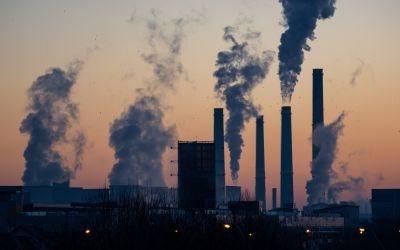World leaders call for global carbon pricing
World leaders have issued a joint statement urging governments and businesses to set up carbon markets and tax carbon emissions ahead of COP21

World leaders, as well as heads of cities and corporations, have issued a joint statement urging governments and businesses to set up carbon markets and tax carbon emissions ahead of climate talks in Paris in December.
The statement has come as a part of a last week of discussions in Bonn, Germany. The meeting aims to agree the language of the global climate change agreement it is hoped will emerge from Paris.
A draft of the agreement to be approved in Paris currently excludes language on carbon pricing because some countries are opposed to the use of markets to address climate change.
“We should advance our effort along this path further so that we can actually reach our goal,” German Chancellor Angela Merkel said in the statement.
The call to price carbon comes from the Carbon Pricing Panel, a group convened by World Bank Group President Jim Yong Kim and IMF Managing Director Christine Lagarde.
The group hopes to spur further, faster action ahead of the Paris climate talks. They are joined in this effort by OECD Secretary General Angel Gurria.
German Chancellor Angela Merkel, Chilean President Michelle Bachelet, French President François Hollande, Ethiopian Prime Minister Hailemariam Desalegn, Philippines President Benigno Aquino III, Mexican President Enrique Peña Nieto, Governor Jerry Brown of California, and Mayor Eduardo Paes of Rio de Janeiro.
French President François Hollande said: “If we really want to send market signals to enable enterprises to make their decisions under optimal economic conditions, which may be optimal ecological conditions, then the issue of carbon prices inevitably arises as it is the most tangible signal that can be sent to all economic actors... I am aware of the fears created by this notion of carbon pricing, particularly among the most carbon- intensive industries, which have concerns, and rightly so, over their competitiveness. We must therefore act with resolve. Countries, big countries such as China, are already setting carbon prices. Europe already has a carbon market.”
Eduardo Paes, Mayor of Rio de Janeiro and chair of the C40 Cities Climate Leadership Group: “Rio de Janeiro, like most of Brazil, is already experiencing the impacts of climate change - and we're already taking action... We're investing heavily in climate-resilient infrastructure, and we're also committed to slashing carbon emissions across our economy. Putting a price on carbon will serve to accelerate our efforts to build low-carbon urban prosperity - not just in Rio, but in fast-growing cities around the world.”
These global leaders are calling on their peers to join them in pricing carbon to steer the global economy towards a low carbon, productive, competitive future without the dangerous levels of carbon pollution driving warming.
Through strong public policy they are providing certainty and predictability to the private sector so they can make long-term investments in climate smart development.
Merkel added: “Low carbon technologies are an element in the fight against worldwide climate change. With a price for carbon and a global carbon market, we promote investment in these climate friendly technologies. Many governments are already putting a price on carbon as part of their climate protection strategies. We should advance our effort along this path further so that we can actually reach our goal of maintaining the two degree upper limit.”
Private sector support comes from US Institutional Investor CalPERS, ENGIE of France, Mahindra Group of India, and Netherlands-based Royal DSM, who will help link business needs with public policies through the Carbon Pricing Leadership Coalition, an action based platform that will be officially launched in Paris on November 30, 2015.
World Bank Group President Jim Yong Kim said: “There has never been a global movement to put a price on carbon at this level and with this degree of unison. It marks a turning point from the debate on the economic systems needed for low carbon growth to the implementation of policies and pricing mechanisms to deliver jobs, clean growth and prosperity... The science is clear, the economics compelling and we now see political leadership emerging to take green investment to scale at a speed commensurate with the climate challenge.”
Christine Lagarde, Managing Director of the International Monetary Fund, said: “Finance ministers need to think about reforms to fiscal systems in order to raise more revenue from taxes on carbon-intensive fuels and less revenue from other taxes that are detrimental to economic performance, such as taxes on labor and capital. They need to evaluate the carbon tax rates that will help them meet their mitigation pledges for Paris and accompanying measures to help low-income households vulnerable to higher energy prices.”
Around the world, about 40 nations and 23 cities, states and regions have implemented or are putting a price on carbon with programs and mechanisms covering about 12 percent of global greenhouse gas emissions.
The number of implemented or scheduled carbon pricing instruments has nearly doubled since 2012, reaching an aggregate market value of about $50 billion.
This collective effort is providing the tools to take the vital step towards pricing carbon and is captured in FASTER principles developed by the World Bank Group and OECD, with input from the IMF. These principles are based on fairness; alignment of policies and objectives; stability and predictability; transparency; efficiency and cost-effectiveness; and reliability and environmental integrity.
California Governor Edmund G. Brown Jr. commented: “We can’t stand idly by as billions of tons of carbon pollution spew into the atmosphere... California has put a price on carbon, but these efforts mean little unless the world’s government and business leaders join us – and go even further.”




_400_250_80_s_c1.jpg)

